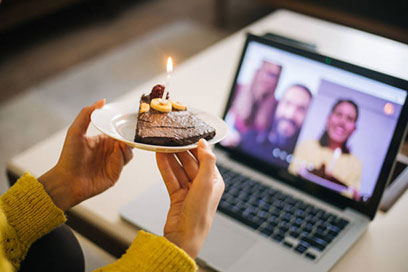To Live Even Through Death

To leave clear instructions of how one’s death should be even whilst battling cancer, is not only being thoughtful to those left behind, but demonstrates a life fully lived. This is the story of Vandana*,who wanted her death to be as comprehensive as her life.
Vandana’s husband passed away when their son and daughter were still very young. She did not marry again, she became an entrepreneur and started a tiffin service from home, all the while raising her children as a single mother in the city of Mumbai. Many years later, her daughter got married and left for Gujrat, and Vandana lived with her son, daughter in law and grandson. There was a lot of love, mutual respect, and attachment within the family.
In 2016, Vandana was diagnosed with cancer of the ovary; she was 60. Despite undergoing treatment, over the course of time, the cancer, as is its nature, metastasized to the peritoneum. When PALCARE enrolled her in the summer of 2022, Vandana informed the PALCARE team that six years ago when she was diagnosed, she was told she only had six months to live. She had defied the odds and six years later here she was, talking to them.
On PALCARE’s first visit to Vandana’s home, she recounted the immense pain she experienced prior to and while passing motion. That was probably the most distressing symptom she had. She once said she was scared to go to the toilet anticipating the pain. She mentioned being terrified seeing clotted blood, but she got used to it, and the pain, to a large extent.
Vandana was a deeply religious woman. She had a clear code of conduct which she followed and instilled in her children throughout her life. She had a strong sense of dignity and was very clear about how she wanted to live, and how she wanted to die. She was clear about no more hospitals, and not taking any further curative treatment, and she only wished that her pain could be controlled. That is when PALCARE came into her life.
The team got to work, carefully designing a care plan with Vandana and the family. The pain and other symptoms were brought down substantially with the right medication. The PALCARE team integrated itself with the family, supporting and guiding them at every step.
Vandana understood her diagnosis, however she was not completely aware of the gravity of it and the prognosis that it came with. The son who could not find the strength in him to break bad news to his mother, asked PALCARE to help him with this task. The thought was already pressing on Vandana’s mind for a while. The conversation with the PALCARE counsellor only made it easier for her to understand. She said she had lived a full life and although she was not scared of dying, the thought of leaving her family and not being there to see her grandsons grow into young men, was scary at times.
Palliative care emphasizes that patients be treated as humans with emotions and not just patients who are dying. A space of trust, openness, respect, and compassion is created. There is a shift in care giving when this is realized.
A bond was built, over the course of time, between Vandana, her family, and PALCARE. She would eagerly await the PALCARE teams visit. In a hand written letter to the counsellor, Vandana expressed that she and the team were a source of strength to her and her family.
 The cancer spread slowly but surely. Vandana left this world in December that year. It was Christmas eve. A week before that she celebrated her 66th birthday. All her loved ones were with her. She wanted the PALCARE team to be there too, but since they could not, she insisted they be taken on a video call, while she cut the cake. It was an emotional and a lovely affair.
The cancer spread slowly but surely. Vandana left this world in December that year. It was Christmas eve. A week before that she celebrated her 66th birthday. All her loved ones were with her. She wanted the PALCARE team to be there too, but since they could not, she insisted they be taken on a video call, while she cut the cake. It was an emotional and a lovely affair.
Before she died, Vandana reconciled with her brother, with whom she had a long-standing dispute. She saw one of her grandsons leave for Canada for further education. She left clear instructions on what needs to be done after she died, what she would wear, the precise rituals that were to be done, what each of the family members should do, and she told them how the transition should be. Her death, much like her birthday a week before, was in many ways than not, a celebration.
*Name has been changed for the purpose of confidentiality*

